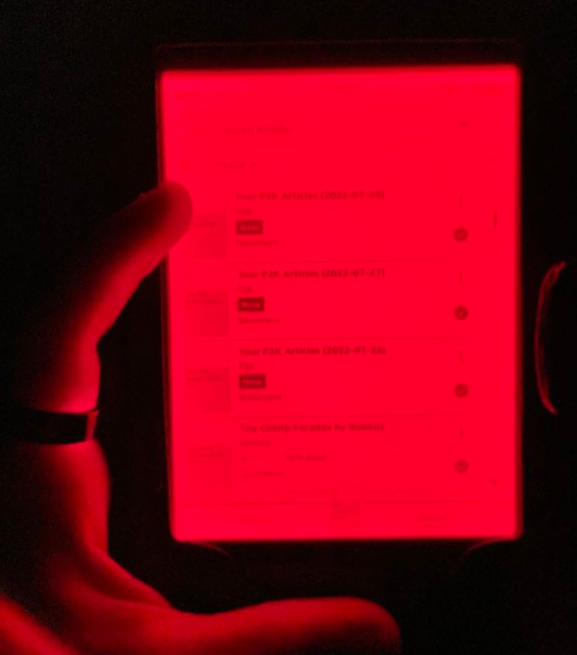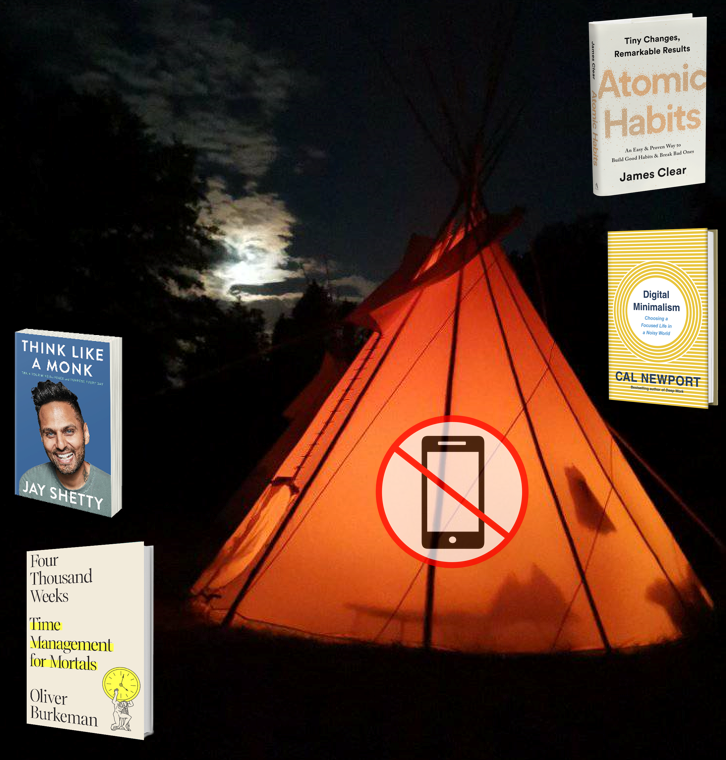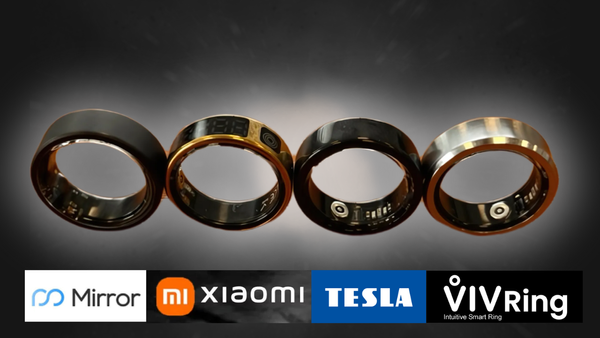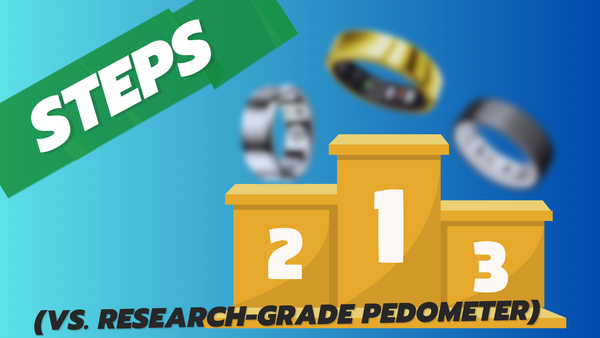Digital detox at summer camp
I do enjoy connecting ideas across topics and this article will be such a short reflection on the following topics:

I do enjoy connecting ideas across topics and this article will be such a short reflection on the following topics:
- Digital minimalism / detox
- Nature
- (Atomic) Habits
As the list above suggests, as well as the opening image, I use mainly these books as my sources: Digital Minimalism (Cal Newport) and also Atomic Habits (James Clear).
The text below is in two parts, the first written before the camp and the second after.
🏕️Before
I’ll be spending approximately 10 nights at Scout camp over the next few days, and this is the perfect opportunity to leave all my “distraction” toys at home, especially my work laptop, Netflix tablet, and most importantly, my multi-functional (too much smart) smartphone. We can basically call the time spent this way a digital detox, which is actually the ultimate version of digital minimalism.
Cal Newport himself recommends a 30-day digital fast in his book as a way to:
1) Reflecting on our (bad) habits, especially in relation to mobile phones, and also on the many addictions (often in the form of single apps) that we have created through our daily doses of them.
2) Becoming aware of what I actually enjoy, and what runs through my head on automatic mode when I don’t give my brain the necessary dose of scrolling and clicking.
If I go beyond Cal Newport, it’s also a way to set an example to my kids that there are situations where a cell phone isn’t necessary (and there’s perhaps no better example than camp in the great outdoors)
Potential disagreement with rational myself
Next, I want to confirm that most of the activity on my mobile actually is pure FOMO (Fear of missing out), that someone wrote to me on WA/FB…, someone liked my post/comment, a shipment was delayed, this football player transferred over there… and I JUST DON’T KNOW IT RIGHT NOW! Perhaps the fear of not being able to instantly google some answers to questions in my head is part of FOMO category as well.
Other arguments against digi-detox I had to deal with were:
- the lack of a camera and instant photo-sharing capability — someone else will simply take the photos and I can have an only audio call with my family like in the old days :-)
- I will lose some streak, for example on Duolingo — that’s simply a fact,
- I won’t know the immediate bio-response from my wearables (Oura 3, Dreem2, Garmins) — I don’t take those with me and that’s it.
I’ve also thought about taking a smartphone with me and just not using it. But I’m already smart enough to know I’m too smart and figure out what I need to turn my data on for right now, and I wouldn’t even think twice and suddenly I would be sitting on the latrine scrolling Instagram.
So here I have strictly applied perhaps the most important thing from James Clear’s book, which is that if I want to “turn off” a habit, I have to make its potential activation unattainable. In this case, I won’t have my phone (or even) handy. At the same time, if I stick with the ideas of this book for a while, it’s an opportunity to break the chain of habits (for example — toilet->mobile, or morning->mobile) and a chance to include something else, more useful or more fulfilling, in the empty space.
📋What are the benefits
More Arguments for digital detox:
1) 🧑🏻🤝🧑🏻 Increase social interaction — you know when you’re sitting somewhere in a group of people just looking at a screen? How does that person communicate and what is the speed and quality of his response? This can be eliminated by your own example.
2) 😴 Better sleep and health in general — this has multiple levels, fewer distractions and stress during the day for the brain, less dopamine wringing, and also optimizing melatonin production related to the displays.
3) ⏳ More time and energy — well, just look at how much time you spend in what app :-) You get this time to spare.
4) 💡 New ideas and better proactivity — that’s the equation for me 2)+3)=4) . Your head will be more rested due to better sleep and more time and energy will be automatically invested in new ideas.
5) 🧒Example for children — children copy adults a lot and here I also find support in the so-called Scout method, specifically in the point of the Adult Support, which says that the adult shows the younger ones the way. And I know I don’t want to show it with the incessant holding of smartphone in my hands, even with the knowledge that phones are more attractive (read “harmful” or “addictive”) to children and teens than it is to adults.
In short, win-win-win-win-win.
Detox arsenal:
- Kindle reader — yeah, it’s a display, I know, but it’s a book, or more — a lot of books, plus no internet connection, and I may take with me a paper one for backup.

- A dumb phone — I didn’t end up finding one, so I’m relying on borrowing a phone from friends if I (absolutely) need it.
Back to the nature
Nature is my favorite element of the already mentioned Scout method. According to it, nature is (not only!) for Scouting “a source of emotional and spiritual development” and “the most natural educational environment”.
In my opinion, nature is an absolutely brilliant environment for such detox exercises and is conducive to living in the present moment (mindfulness). Coincidentally, I’m currently reading the book Think Like a Monk (Jay Shatty) and he sees observing nature as a technique for rebooting one’s life values and a way to let go of low values (greed, envy, anger, lust, etc.).
To conclude this little sub-chapter, I will help myself with one more quote from A. Einstein:
Look deep into nature, and then you will understand everything better.
🏢 AFTER
I will try to summarize some of my thoughts and experiences from the camp and from the pre-departure period.
Even during the packing for the camp and departure, when I finally turned off my phone and put it away in a drawer, I felt slightly uneasy and de facto experienced slight symptoms of nomophobia, which is a term for an anxiety disorder or phobia that consists in dependence on one’s mobile phone.
For the first two days, I had a downright anxious feeling that I was missing something and had “tics” in my hand. Regular withdrawal. By the third day, the situation had consolidated a bit and I had a certain sense of clarity of mind and senses. Yes, it may have been a placebo to some sense, but it also served its purpose.
I had the impression that the rustling of the leaves, the singing of the birds, the crackling of the fire, and the rushing of the water were somehow more audible sounds. The clouds, sun, and stars are more visible, and the world is more colorful in general. But enough of the melancholy, I also observed my camp brothers and sisters’ cell phone use much more, it was a bit like a red flag for a bull, but I kept quiet. I know that actively advocating for digi-detox would be rather counterproductive and everyone has to find a functional balance for themselves.
In fact, I was unconsciously preparing the optimal ground for so-called deep work, which is, among other things, the central theme of the book by the aforementioned author — Cal Newport — Deep Work. One of the essential ideas of this book is that distractions (and also multitasking) are the biggest enemies of focus and productivity. And the majority source of distractions these days is the mobile phone.
What’s next?
I don’t know, there are many ways, in my notes (handwritten :) there are mainly:
- The strict definition of offline time (=off!)
- Better use of Focus mods within iOS
- Downgrade the phone (more maybe later)- actually, I am thinking of Light Phone 2 — any experience with this?
I still have to absorb all this further, but I’m sure that getting a Digi-detox can become one of the effective means to become aware of your addiction, which most of us suffer from.
Need to say, it is rewarding to consciously discover how much time and energy one gains by limiting technology. For the last time, I will refer to a book — Four Thousand Weeks, which already evokes the temporal limitations of our existence on this planet in such an exacting title. I like the fact that this book looks at technology from a broader perspective, i.e. that it’s not just about the time we spend “staring at a screen” but also the way we think. The author describes how he thought about writing a tweet in honor of the birth of his son, instead of fully living the moment. I’m sure many of us will find a strong analogy when taking photos and eventually sharing them on social media/group chats.
So in the end, my “camp library” has grown and the opening photo deserves a more up-to-date version:

P.S. I recommend the Blinkist service as an extract of essential ideas from selected books, and I used it in writing this report: blinkist.o6eiov.net/fitnesator (affiliate link-as some of the others in this article, if you use it, thanks ;).



